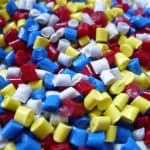
The economic situation of the plastics industry did not change significantly compared to the previous week. Bigger changes are expected after Easter. Many people assume that some companies may not start up after the holidays.
Commodity polymer producers and traders predicted good demand for April. However, there are fewer overseas imports of materials on the market and less is expected to arrive.
An important development over the past week has been a decline in the willingness of credit insurers to take risks. Credit insurers are much more sensitive to payment delays and payment rescheduling requests than ever before. It is very difficult to get credit insurance for a new buyer. This is not the time for traders and manufacturers to get new buyers. There is no serious problem for the time being, however, liquidity (financing) decreases as some industries stop. This can be a problem in the event of a re-start after the epidemic. Unfortunately, the expected time for the virus to progress and the restart of the industry seems to be shifting further and further. Even optimists are expecting partial start-ups in May at the earliest. Now, all eyes are on governments, as transport and lockdown restrictions can stop industries. Most companies fear that they will find their employees infected. After all, stopping means serious financial loss.
At the time of writing, olefin monomer prices are already known. The price of ethylene (C2) fell by EUR 200 and that of propylene (C3) by EUR 175. This will mean a nearly three-digit drop in polymer prices. But most likely, the total monomer price drop will not pass into polymer prices. You can read more about this in our freshest Weekly Commodity Price Report displayed Sunday night.
The plastics industry continues to show a mixed picture across applications.
The production of food packaging material generally goes well. This is especially true for film grades. This trend is expected to remain so, because grocery stores are still open. And the restaurants are closed, so the population prefers to cook at home. As a result, demand for high-end packaging material is likely to remain during the curfew restrictions, and there is also still very good demand for canisters and bottles for household cleaning product packaging and related caps and closures.
Pharmaceutical packaging is better than normal seasonal demand for both immediate and bulk packaging. Demand for packaging for hygiene products is also very strong.
Demand for construction products remains high. Especially for paint, plaster packaging. For the time being, there is no slowdown in the area of building material packaging. Construction companies try to work without stopping. There is no outstanding demand in the pipe segment, it is generally seasonal. Most outdoor pipe producers are running at full capacity. The industry is confident.
The agricultural season has begun. Film, twine, mesh producers operate at full capacity with high stock levels. Irrigation pipe manufacturers are also in high season. Demand, except for agricultural film, is good, but it is past its season.
The demand for packaging materials related to catering and food delivery is decreasing. This applies primarily to products made from thermoformed and foamed plastics. Injection molded food packages of more than 5l, which are primarily aimed at large users, have declined significantly. This is mainly due to restaurant closures and home cooking activities of the general public.
Demand for industrial packaging has declined, including prefabricated blister bags, corrugated sheets and wrapping packaging.
Demand for "houseware" is also mixed, varying from company to company. Those who can manage export shipments will continue to work close to full capacity. However, cancellations and deferrals are becoming more common. Domestic sales are still not an issue.
Compounders also make partial stops, mainly due to the shutdown of the automotive and consumer electronics industries.
Several car manufacturers have promised to restart this week. This has however not been the case. No factory is expected to resume before Easter. New car sales have also fallen, with low sales expected to the end of the epidemic. On average, sales in Europe are expected to decline by 20-25% in 2020. It would probably have a stimulating effect on demand if we delayed the CO2 regulation that came into effect this year by 2 years. And again, cars could be cheaper.
More and more automotive parts manufacturers are stopping, among the largest, now that BOSCH has announced the closure of several manufacturing units.
Most of the furniture companies stopped. Just some smaller companies work only, but their packaging and component needs are low.
Conditions:
- BRENT oil price 22.76 USD/barrel, falling oil prices
- EUR/USD: 1.1025, weak Euro.
- NAPHTHA (European): 247.76 USD/t, falling prices, lowest price in the last 10 years.
April contract monomer prices:
- Ethylene (C2) contract price -200 EUR/t (720 EUR / t)
- Propylene (C3) contract price -175 EUR/t (650 EUR / t)
- Styrene monomer contract (SM) price is not yet known
Incoming information is shared once a week in a newsletter and on myCEPP. If you would like to sign up for our newsletter, please send an email to one of the email addresses: laszlo.budy@myceppi.com; gyongyver.majoros@myceppi.com; andrea.nagy@myceppi.com.



